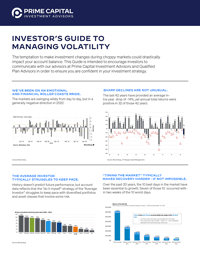We’re here to help clear up some of the confusion about annuities during Annuity Awareness Month, which happens each June!
In the first quarter of 2024, U.S. annuity sales were $106.7 billion, the highest first quarter total since the 1980s, when LIMRA first started tracking annuity sales. Despite these high sales numbers, research indicates that many people don’t really know what annuities are.
One recent study revealed that only 9% of consumers say they feel very knowledgeable about annuities, while other studies confirm this lack of understanding. Research by the American College of Financial Services gave older Americans a score of 12% out of a possible 100% for their knowledge of annuities based on their performance on a short quiz. And a TIAA Institute and Stanford University study showed that the annuity ranks dead last—respondents know more about Medicare, life insurance and long-term care than annuities.
During Annuity Awareness Month, we wanted to cover some facts we hope will help you understand annuities better.
Annuities Are Contracts
When you invest in something, typically you assume all the risk. Since annuities are not investments, but instead are contracts between you and an insurance carrier, one of the main risks you assume with annuities is that the payouts will be made per the terms in your contract and that you can rely on the claims-paying ability and financial strength of the issuing insurance company. And there are many different types of annuity contracts.
Fixed Annuities
Fixed annuities are probably the easiest type of annuity to understand because they work similarly to the way a bank CD (certificate of deposit) works. An insurance company will pay a fixed interest rate on your fixed annuity contract for a selected term, usually from one to 15 years.
Variable Annuities
Variable annuities were developed in the 1950s, and unlike most other types of annuities, before purchase they require that you be issued a prospectus, since part of your money will actually be invested in the stock market. This means that there is market risk involved. While variable annuities are usually purchased with the expectation that at some point the contract owner will annuitize or begin taking periodic payments, depending on contract terms, your annuity payments may fluctuate based on stock market performance, and it’s possible that some variable annuity policies can lose principal due to stock market losses.
Fixed Indexed Annuities
Fixed indexed annuities (FIAs) were first designed in 1995. The biggest difference between FIAs and variable annuities is that fixed indexed annuities are not actually invested in the stock market so they are not subject to market risk. Instead, a selected index (such as the S&P 500) is used as a benchmark for policy credits at periodic intervals, such as annually.
Many FIA contracts offer a minimum amount which gets credited, and nearly all FIA contracts will not credit less than 0%, which means even that if the benchmark index loses money, your FIA contract value will not go down. With fixed indexed annuities, after you have owned the policy for a specified number of years (called the “surrender period”), any policy credits or gains are locked in. And most FIAs offer the option of lifetime income no matter how long you live either as part of the main annuity contract, or available as a rider for an additional charge.
Other Things to Know About Annuities
Some annuities can be purchased on a deferred basis, and some on an immediate basis, and you can use pre-tax or after-tax funds. It’s important to get professional help to understand the implications for your particular situation.
Annuities must be considered carefully based on your particular situation because they are not liquid. Almost all annuities are subject to early withdrawal penalties. Make sure you understand the contract terms and the type of annuity you are purchasing. Your financial advisor and tax and legal professionals can help you compare and analyze policies.
It is very important that you have a trusted financial professional, tax professional and/or legal professional by your side to examine the terms and language of your annuity contract as well as provide information about the insurance company’s financial rating before you make any decision.
Are you prepared for retirement? Contact us to explore your options!
This article is provided for general information purposes only and is accurate to the best of our knowledge. This article is not to be relied on or considered as investment or tax advice.
Guarantees provided by annuities rely on the claims-paying ability and financial strength of the issuing insurance company.
This information does not constitute legal or tax advice. PCIA and its associates do not provide legal or tax advice. Individuals should consult with an attorney or professional specializing in the fields of legal, tax, or accounting regarding the applicability of this information for their situations. Advisory products and services offered by Investment Adviser Representatives through Prime Capital Investment Advisors, LLC (“PCIA”), a federally registered investment adviser. PCIA: 6201 College Blvd., Suite 150, Overland Park, KS 66211. PCIA doing business as Prime Capital Wealth Management (“PCWM”) and Qualified Plan Advisors (“QPA”). Certain services may be provided by affiliates of PCIA.
Sources:
https://insurancenewsnet.com/oarticle/consumer-knowledge-gap-persists-despite-booming-annuity-sales
https://www.nber.org/system/files/working_papers/w6001/w6001.pdf





